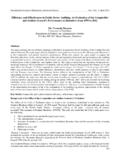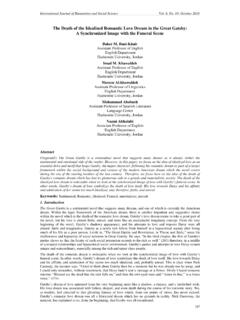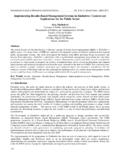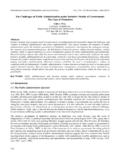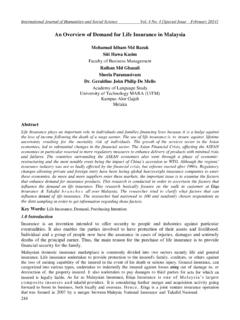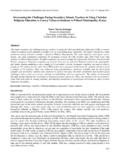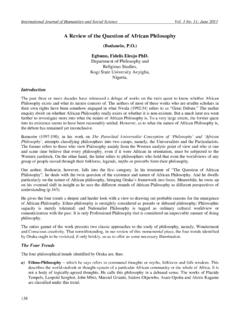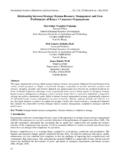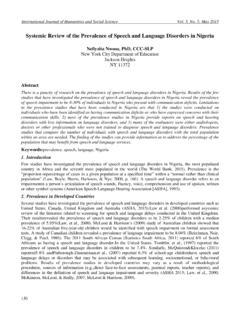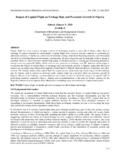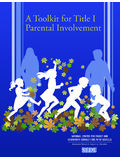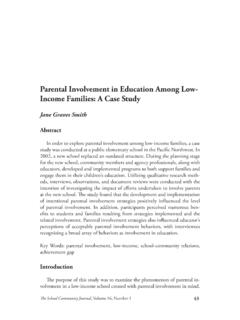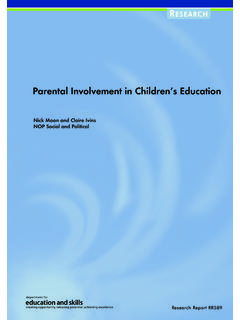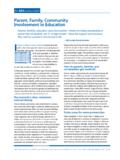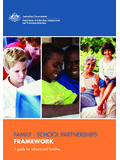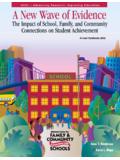Transcription of Understanding Parental Involvement in American Public ...
1 International Journal of Humanities and Social Science Vol. 2 No. 19 [Special Issue October 2012] 41 Understanding Parental Involvement in American Public Education Dr. Gwendolyn L. Watson Policy & Compliance Tennessee Achievement School District 710 James Robertson Pkwy, Fifth Floor Nashville, TN 37243, USA. Dr. E. Ren e Sanders-Lawson Assistant Professor Department of Leadership University of Memphis 123 Ball, Memphis, TN 38152, USA. Dr. Larry McNeal Professor Department of Leadership University of Memphis 123 Ball, Memphis, TN 38152, USA. Abstract To understand Parental Involvement in American Public schools it was important to examine the literature on the evolution of parent Involvement in education in America in terms of its development and policy perspective.
2 Further, the review of the literature examined parent Involvement overall, including the purpose and impact of parent Involvement as well as the barriers to parent Involvement and parents motivation for Involvement . Introduction American Parental Involvement in the welfare of children had long been a concern of Public officials. Family Involvement in the welfare of children in both health and education spanned decades. The recognition of the value family Involvement played in the healthy development of children had origins spanning thirty years (Dokken & Ahmann, 2006). Relative to the care of children s health, PL99-457 required the development of individualized family service plans that mandated a family centered approach and family and professional collaboration.
3 Likewise, family Involvement in education had a similar history. According to Trotman (2001) parent Involvement was designed to create a partnership that allowed for greater collaboration between home and school for the expressed purpose of improved student outcomes. It was intended to enhance the school s capacity to understand and appreciate values and cultures of families and be more effective in meeting student needs. Parent Involvement in education was important because it added value to the educational development of students of all ages and populations (Ascher, 1988; Hickman, Greenwood & Miller, 1995; Rhine, 1981, as cited in Wehlberg, 1996; Montesinos, 2004).
4 Wehlberg (1996) also indicated that parent Involvement programs might require making opportunities available for some parents while having to provide knowledge and skills for other parents so they could learn how to be involved and feel comfortable taking advantage of the opportunities to be involved. Parent Involvement was by definition ambiguous and was often discussed in terms of inconsistent categories or types of parent Involvement . Wehlburg (1996) cited Hoover-Dempsey et al. (1987) who defined Parental role in the two categories of home based activities such as helping with homework and school-based activities such as tutoring and volunteering in schools.
5 The Special Issue on Business and Social Science Centre for Promoting Ideas, USA 42 Parental role was defined in six categories: (a) traditional (parent as audience or bystander-observer), (b) parent as a decision maker (PTA), (c) parent as a classroom volunteer, (d) parent as a paid paraprofessional or teacher s aide, (e) parents as learners (participants in child development or parenting classes), and (f) parents as teachers of their own students at home (Gordon, 1977; Bauch, Vietze, & Morris, 1973, as cited in Wehlberg, 1996). According to Wehlberg (1996) and Epstein (1988), parent Involvement was: (a) basic obligations of the parent (health, safety, etc.)
6 , (b) basic obligations of the schools (schools communicate to parents about programs/progress), (c) parent Involvement in schools (volunteering and participating in extracurricular activities, sports, plays, etc.), (d) parent Involvement in learning activities in the home (parents initiating activities with their child or child initiating help through questions), and (e) parent Involvement in Governance and Advocacy (parents assume decision making roles). Jasso (2007) indicated there were still other definitions of parent Involvement ; however, he pointed out that often while social factors had been blamed for children s school failure, more in-depth examination revealed that Parental intervention had a greater impact on student success than socioeconomic status and family dynamics.
7 Further, he suggested that Parental Involvement extended beyond simply ensuring homework was completed successfully or attendance at Parent Teacher Association (PTA) meetings. Luneburg and Irby (2002) reported that Parental expectation for their children s achievement participating in school activities, offering encouragement, and providing home learning environments produced more positive outcomes for children. Capitalizing on parent Involvement , according to Luneburg and Irby (2002), required strategies to help parents decide how they will become involved in the school, how they will receive support from the school, and how school, family, and community partnership could better enhance student achievement.
8 Schools must recognize there was no one-size-fits-all model for school-parent partnerships, but the model chosen should reflect site-based goals for revitalization and student success. Parents varied in their beliefs about their role in the education of their child (Jasso, 2007; Ritblatt, Beatty, Cronan & Ochoa, 2002). However, Wehlburg (1996) pointed out that parent Involvement had a positive effect on the achievement of students and that all parents should be viewed as having valuable resources to contribute to increased student learning. Historical Evolution of Parental Involvement Hiatt (1994) highlighted the fluctuations in parent Involvement over the decades and noticed changes in both the level and type of parent Involvement in education, from the seventeenth century forward.
9 In the early years, education of children was the primary responsibility of the parents, with little or no formal Involvement from a structured educational entity. As the American population began to experience a swell in immigration, the large cities, like farming communities, began using children in the labor force until organized unions protested and disrupted the practice. This left a large population of youth roaming the streets with nothing to occupy their time and appeared threatening to some. This coupled with the viewpoint from some that many of these parents were low-skilled, uneducated, and therefore unable to properly educate children equipped to improve society, caused parents to begin to lose control of educating their children, as more formalized Public schools began to spring up across the nation.
10 Continued formalization and standardization of the teaching and learning processes in education evolved over time, which caused parents to be more and more detached from the education of their children (Hiatt, 1994). Over time, however, parents resisted this isolation and devaluing of their contributions to their children s education and pushed back by forming the National Congress of Mothers in 1897, the forerunner to the National Parent Teacher Association (PTA). This group s intent was to counter the exclusion of parents in the education of their children. Martinez (2004) offered a chronology of parent Involvement in education in America.
